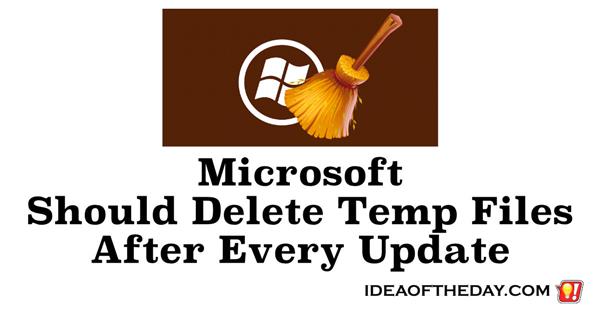Microsoft Should Delete Temp Files After Every Update.

By
Staten Island, NY Posted: 2/22/2015 1:00:00 AM
Have you noticed that your Windows folders keep growing and growing? Blame Microsoft for that.
I'm venting again.
I remember the days before Windows, when the operating system was lean and mean. Back then, computers had very little disk space and even less RAM, so it was critical that the operating system be as small as possible. As memory, speed and disk space increased, companies like Microsoft have given up on efficiency and operating systems like Windows have become a bloated mess.
I've got several issues with Windows Bloat, but I'll focus on just one thing today... the way they handle temp files when doing updates. Here's what happens, step by step:
1. With every new update, your system downloads newer versions of many of the files in your system. That sounds easy enough.
2. To make the download go quicker, they download these files in compressed format. So, after the update, you've got the original files, plus a compressed version of the updated files.
3. Next, it needs to uncompress the downloaded file. Here's where it starts to get interesting. If you're keeping track, after this, you now have the original files, compressed versions of the updated files, then uncompressed versions of the updated files. That means at this moment, we now have 3 of each file.
4. Next, the system needs to install the new files, so it starts making a list of the files that need to be changed, and makes a backup copy of the original files, just in case something goes wrong... yes, we now have a 4th version of the files.... the backup... plus a list / log file
5. After the backup, it finally puts (a copy) of the updated files into the system folders, and it writes yet another log file detailing what it did.
6, After everything is confirmed, the other copies of the files are dropped and you now have just the updated version... right? Not quite. For most updates, all those other versions are still sitting there in a bloated folder full of temporary files.
What makes matters worse is that as time goes on, many of the files you just updated will be updated again and again, leaving potentially dozens of copies of the same file. Then there's the Registry changes, but I won't even get into that.
The only way for most people to get rid of all these files is to purchase third party software, which is pointless.
Microsoft claims the reason for doing things this way is so that they can uninstall any given update at a later date and revert back to the saved versions.
I think this way of updating the operating system is antiquated, and Microsoft should treat each user's drive space as a precious commodity that should not be wasted. Updates to the operating system should be more like iOS updates, where the objective is to keep it as small as possible by treating the core system as a single package that works together and cannot be rolled back to a previous version.
Yes, that means that sometimes they release a bug, that can't be fixed until the next update, but when they fix it, they know that each component in that update works as expected with the other parts of the update. This is quite different from the complexity of a Windows update, where some users skip certain updates, so any time a new update is added it needs to determine which files need to be changed based on what could be a totally different configuration.
In other words, if somebody has Apple's iOS 8.1.3, you know for sure that everyone using that version has exactly the same versions of every O/S file, so there is no reason to guess what versions of each file any given user has when new updates come in.
I'm rambling. I do that when I vent. The bottom line, Windows Updates are a mess, and they leave a mess on everyones system.
 Joe Crescenzi, Founder
Joe Crescenzi, Founder
Related Media:

(Reply N/A) (Edit Topic N/A)
(Like Topic N/A) [0 ] 6309 Views
Related Posts
Microsoft(46)Windows(53)
Top 25 Posts
* Note: The ideas on "Idea of the Day" were posted without any formal research into existing inventions.
In some cases, patents may already exist for these ideas, in other cases, there may not be any existing patents and you are free to develop and explore the viability of developing and patenting the ideas.
The authors make no claim that any of the ideas are safe, practical, or suitable for any particular purpose. You are responsible for the results of trying, developing, patenting or using any of the ideas on this site.
For some people, our ideas are just an interesting read, but our goal is to encourage you to take action. If you see an idea that you like, do something with it... Take action.
- Joe
 on...
on...
 on...
on...